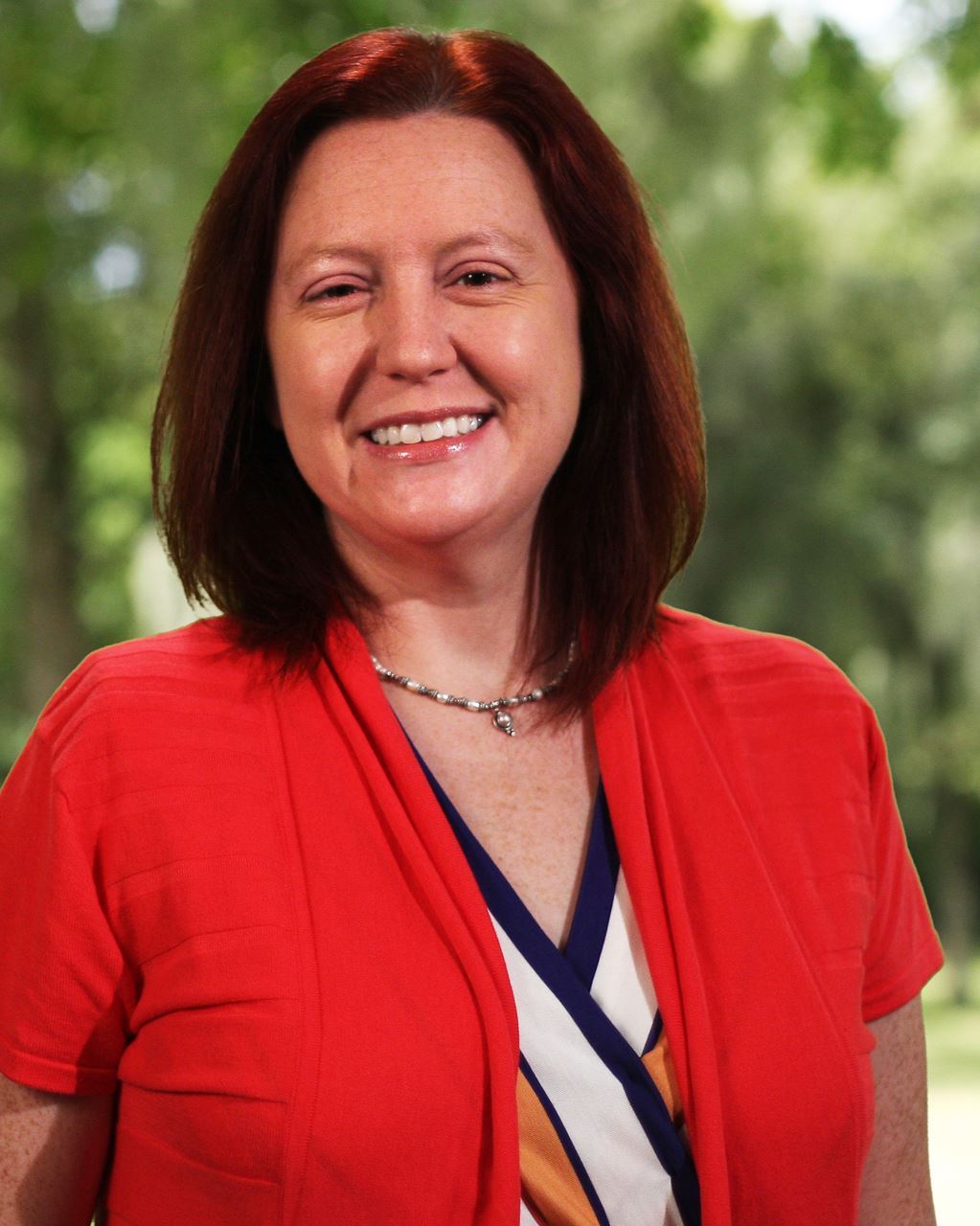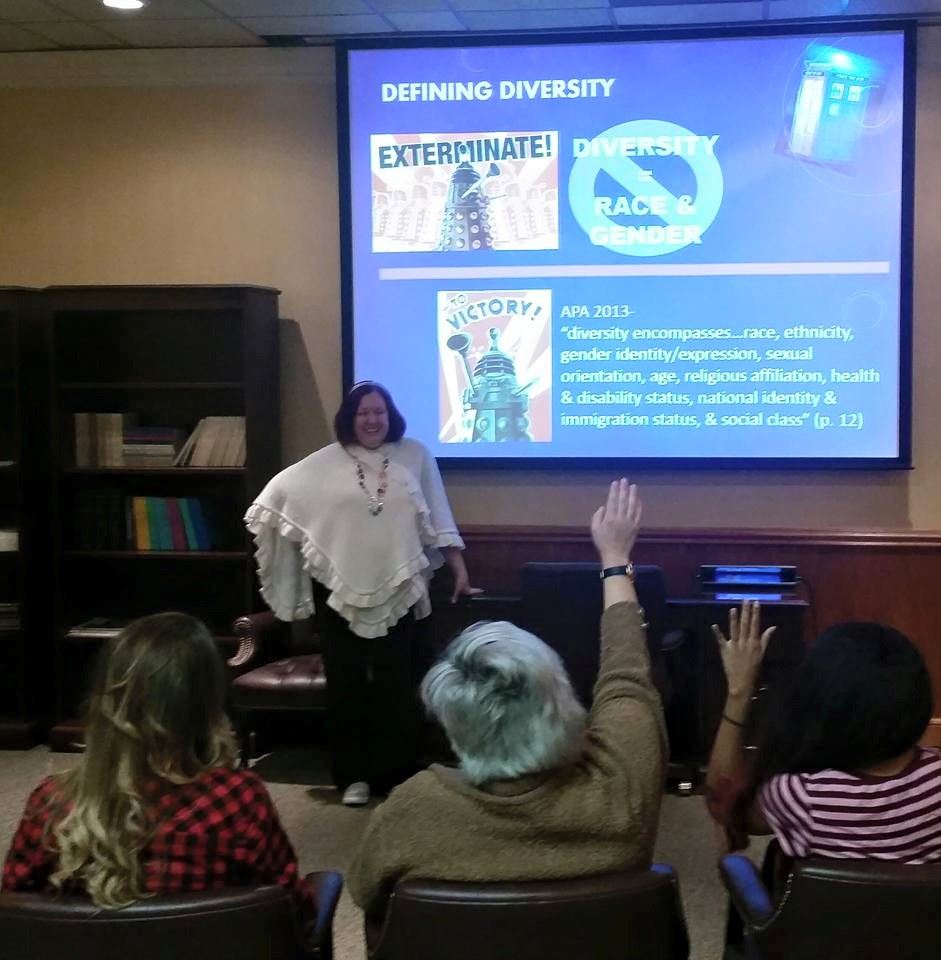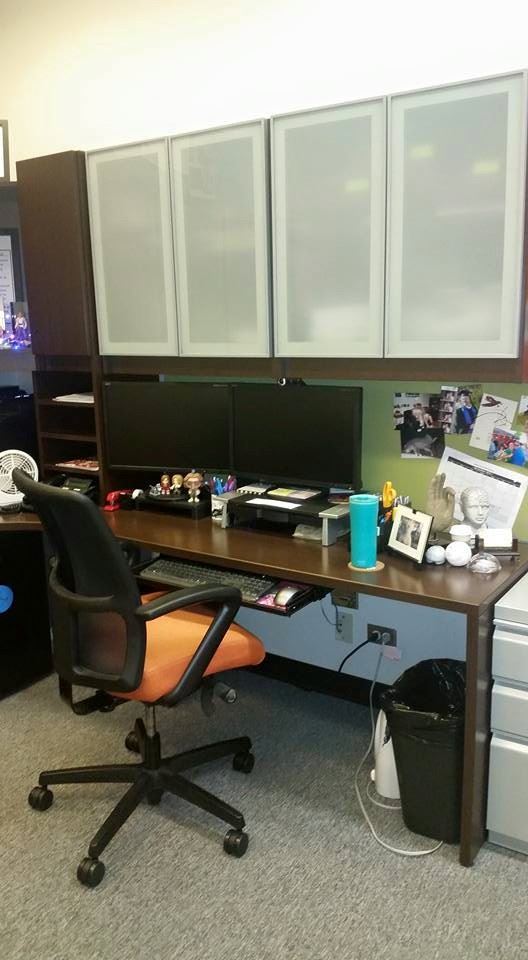 School: University of Houston-Clear Lake
School: University of Houston-Clear Lake
Type of college/university: Master’s comprehensive: about 9,000 students; about half of the students are undergraduate, half are pursuing Master’s degrees, 2 Ed.D. programs; Hispanic Serving Institution; many first generation students
Locale: Regional state university in suburbs of Houston near NASA
Classes I teach: Careers and Writing in Psychology; Psychology of Women; Social Issues Methods and Analysis; Social Issues Seminar; Graduate Internship, Psychology of Gender, Race, and Sexuality
What’s the best advice about teaching you’ve ever received?
Give up control. My friend and colleague Dr. Lillian McEnery told me to try new things in the classroom, even if it scares me. One thing I have come to accept is that there is no perfect course or assignment or activity. You just have to trust yourself and your students that if you try something and it flops, you have the skills and community spirit to pick back up and try something else. This freed me to do much more in the classroom to increase student engagement, get me away from the “sage on the stage” model, and create a brave space for learning.
What book or article has shaped your work as a psychology teacher?
Teaching for Diversity and Social Justice (Adams, Bell, Griffin, 1997), Teaching to Transgress (hooks, 1994); Teaching Critical Thinking (bell hooks, 2010); Why are all the Black Kids Sitting Together in the Cafeteria? (Tatum, 1997); Pedagogy of the Oppressed (Friere, 1970)
 Tell us about your favorite lecture topic or course to teach.
Tell us about your favorite lecture topic or course to teach.
In my courses, students learning about group privilege and intersections of identity for the first time is both a pedagogical challenge and huge reward for me as a facilitator of growth. These topics are most commonly 100% new to my students. Therefore, there is an extremely high payoff when they begin to understand these new concepts and apply them to their lives. At this point in my career, I am turning my efforts to creating resources for other faculty that need support in their teaching about privilege and intersectional theory.
Describe a favorite in-class activity or assignment.
My very favorite assignment is my Intersections of Identity Education Project. Students choose an aspect of intersectional theory such as the intersections of race, gender, and social class to examine women of color in poverty versus middle class. They research the chosen intersection and create a product to be used for public education about intersectional theory. For example, one male student created and provided workshops on masculinity, homophobia, and human trafficking to juvenile detention officers. Another contacted a non-profit immigrant advocacy group in New York City and developed brochures for distribution to migrant domestic workers to inform them of their legal rights. His resulting brochures had already reached over 1,000 workers by the end of the semester. Projects also included a documentary emphasizing how Asian women and men are portrayed in popular films, a board game designed to teach players about oppression, privilege, and intersectionality, and videos on ways forms of privilege intersect.
See website for pedagogical resources and more examples: https://sites.google.com/site/drkimcase/intersections-project
What teaching and learning techniques work best for you?
For assessment, I lean most heavily on reflective papers that incorporate critical thinking while making connections across course materials. I also tend to use reading quizzes to keep students on track so they do not fall behind on reading. My exams are usually a mix of multiple choice, short answer and essay. For graduate classes, all exams are take home and might require 20 hours to complete.
 What’s your workspace like?
What’s your workspace like?
Two widescreen monitors, Doctor Who and Wonder Woman action figures, mini-fridge close by for Snapple, clean and uncluttered, candy jar for visitors, wide array of colorful pens and markers within reach, 4 X 6 foot wipe off board for planning, listing, and imagining.
Three words that best describe your teaching style.
interactive, inclusive, reflective
What is your teaching philosophy in 8 words or fewer?
Toward engagement, critical analysis, and social justice action.
Tell us about a teaching disaster (or embarrassment) you’ve had.
Teaching my first course in as a graduate student at the University of Cincinnati, the city was struggling after a White police officer shot and killed another unarmed Black man, Timothy Thomas (2001). Still under city-wide curfew and civil unrest all around, our next syllabus topic was white privilege. During that class, a white woman passionately yelled out “they’re all animals” in reference to Black Cincinnatians expressing their outrage about police violence and racism. I was more than completely unprepared for how to handle such a volatile statement in a racially diverse class of 70 students. My memory is hazy, but I think I tried to say something about seeking to understand the perspective of others even when it is difficult and uncomfortable. In my mind, this has always been my biggest pedagogical fail.
What is something your students would be surprised to learn about you?
I am a member of an exhibition dance team, Collective Sound Cloggers. We clog at festivals, events, Disney World, schools, etc. Our dances are set to a mix of rock, country, pop, folk, and traditional clogging music. For more see our website: http://collectivesoundcloggers.org/
What are you currently reading for pleasure?
The Crow Road by Iain Banks- great mystery novel about a Scottish family and coming of age
What tech tool could you not live without?
My Android phone. Perhaps sadly, I allow work email to spill over into time when I should be away from work. Also, I use my phone a lot to post teaching items (e.g., videos, articles, blogs) on the Facebook page I created about teaching privilege studies and intersectional theory.
What’s your hallway chatter like? What do you talk to colleagues about most (whether or not it is related to teaching/school)?
In our break room, we have a large table we jokingly refer to as the “Table of Knowledge.” During lunch, faculty gather and discuss a wide range of issues such as the latest political candidate’s anti-immigrant comments, student plagiarism, deconstruct media messages about the Houston anti-discrimination law, ideas for supporting students with disabilities, or university policy changes and the potential impact on student learning. Some days, we just talk about what happened on The Walking Dead or other favorite shows.
